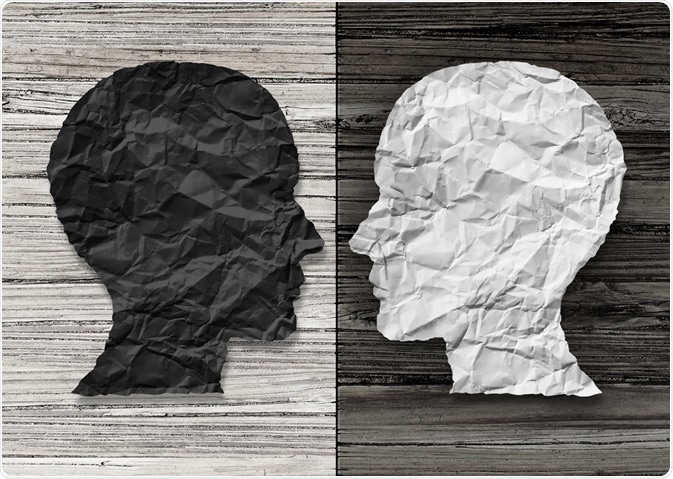A common clinical characteristic of many neurodegenerative diseases is that of depressive disorders amongst other psychiatric disturbances.

Image Credit: Lightspring/Shutterstock.com
Many psychiatric conditions develop as a result of neurodegenerative disease (such as in Alzheimer’s disease and Parkinson’s disease).
Various studies have shown increasing evidence that psychiatric disorders during early life may increase the risk of developing neurological conditions in the future, though the mechanisms are still largely poorly understood.
One such association is between having bipolar disorder and an increased risk of Parkinson’s disease.
Neuropsychiatric Symptoms in Parkinson’s
Parkinson’s disease develops as a result of decreased dopamine availability and releases in the brain due to the progressive neurodegeneration of dopaminergic cells in the substantia nigra.
This leads to dysfunctional motor output from the brain leading to Parkinsonian symptoms including tremor, rigidity, bradykinesia (slow movements), and gait issues (shuffling walking movements).
This is because the subtantia nigra normally has an inhibitive output on motor circuitry in the brain, and the depletion of dopamine cells leads to the disinhibition of motor control.
In addition to the motor symptoms of Parkinson’s, the most common non-motor symptoms include depression (between 17-22% of patients), anxiety, sleep issues, emotional issues, and dementia.
Aside from dementia and sleep issues being a direct consequence of neurodegeneration in the brain, the psychiatric symptoms are also thought to be directly related to the disease.
For example, degeneration of dopaminergic neurons in the ventral mesencephalon (normally involved in emotional and reward behavior), in addition to a reduction to serotonin levels in the raphe nucleus could be responsible for the high rates of depression in individuals with Parkinson’s.
Bipolar Disorder
Bipolar disorder is a psychiatric condition in which there are alternating periods of mania (abnormally elevated mood or energy associated with psychosis; though not always euphoric as it can sometimes be irritable) – or hypomania if less severe, as well as having periods of depression (state of low mood and aversion to activity).
Although estimates vary, it is thought that bipolar disorder affects around 1% of the global population with similar rates amongst males and females. It can develop during the teenage years but it typically starts in the mid to late-20’s/early-30’s.
Although the exact causes of bipolar disorder are still largely unknown, there is mounting evidence that there may be a strong genetic basis as well as environmental factors that contribute to its development.
Although there may not be actual genetic mutations to particular genes that cause bipolar, it could be the combination of single-nucleotide polymorphisms (SNPs) to various signaling receptors and pathways within the brain affecting glutamate signaling, Wnt and Notch signaling as well as dysfunctional DNA repair mechanisms and elevated levels of DNA damage.
Is There an Association Between Bipolar Disorder & Parkinson’s?
Several studies have examined the association between bipolar disorder and Parkinson’s disease and have found that having bipolar disorder may be associated with an increased risk of developing Parkinson’s in the future.

Image Credit: SpeedKingz/Shutterstock.com
For example, a case-study of a 43-year old male with a history of depression and mania who was given antidepressant and mood-stabilizing drugs (including lithium – commonly used to treat mania), however, he never returned to a baseline state.
Whilst undergoing treatment, he reported a slight tremor in his right hand coupled with rigidity and bradykinesia. SPECT imaging found striatal abnormalities consistent with Parkinson’s.
When he was given levodopa treatment for his Parkinsonian symptoms, the psychiatric symptoms also stabilized by the use of venlafaxine (when previously it had little effect on his psychiatric symptoms alone).
A recent study published in JAMA Neurology performed an extensive literature search using key terms including Parkinson’s, bipolar, and mania, and the data were pooled of which all the results were determined as an odds ratio of Parkinson’s.
In their paper, 7 studies met their strict criteria and included over 4 million participants. They found that having a previous diagnosis of bipolar (at a younger age) increased the likelihood of developing sporadic (idiopathic; non-genetic) Parkinson’s disease with an odds ratio of 3.35.
As such, they concluded that the evidence from the literature suggests that people who have had bipolar disorder have an increased risk of developing Parkinson’s to those who have not had bipolar.
Another recent study published in Neurology examined a case-control study from a Swedish cohort and found an odds ratio of being diagnosed with Parkinson’s within the first year of depression was 3.2, with a persistent association between depression and Parkinson’s for over 2 decades where the severity of depression related to the increased likelihood of developing Parkinson’s disease – controlled for lack of genetic history or family history of either depression of Parkinson’s.
However, the authors conclude that disentangling the differences between depression and bipolar and the mechanism behind developing Parkinson’s need to be further explored.
So what could the mechanism be behind depression, mania, and Parkinson’s, and what is the exact correlation of cause or consequence? There may be overlapping disease processes including neuroinflammation, neurotransmitter dysfunction (dopamine, serotonin, and glutamate), and neurodegeneration of key brain areas.
Several lines of evidence have strongly implicated the reduced function of dopaminergic neurons in both Parkinson’s and bipolar disorder, with roles in higher-order cognition, motivation, and movement (common dysfunctions to both conditions).
In summary, there is increasing evidence to support that early life bipolar disorder may predispose individuals, or be a predictor, of Parkinson’s disease development in later life. Often, depression is a major predictor and non-motor symptom of Parkinson’s disease.
The mechanisms behind this may be due to common pathways, such as dopaminergic dysfunction, that can cause both to develop independently. However, having bipolar disorder is not a prerequisite or requirement for the development of Parkinson’s (vice versa), as not all patients with Parkinson’s have had depression (or have depression) in their life.
Sources:
- Pontone & Koch, 2019. An Association Between Bipolar Disorder and Parkinson's Disease: When Mood Makes You Move. Neurology 92(24):1125-26. https://doi.org/10.1212/WNL.0000000000007641
- Faustino et al, 2019. Risk of Developing Parkinson Disease in Bipolar Disorder: A Systematic Review and Meta-analysis. JAMA Neurol 2020;77(2):192-98. doi: 10.1001/jamaneurol.2019.3446.
- Novaretti et al, 2016. Bipolar Disorder, a Precursor of Parkinson's Disease? Dement Neuropsychol. 10(4): 361–364. doi: 10.1590/s1980-5764-2016dn1004018
Further Reading
Last Updated: Apr 30, 2020